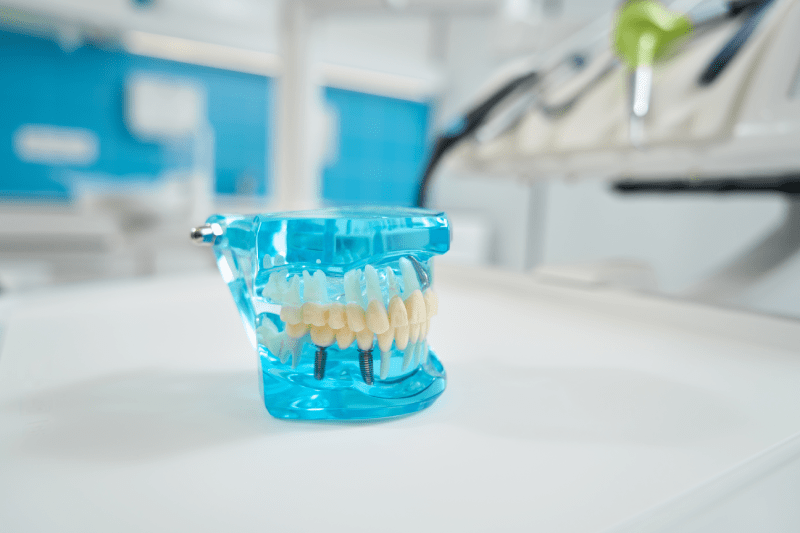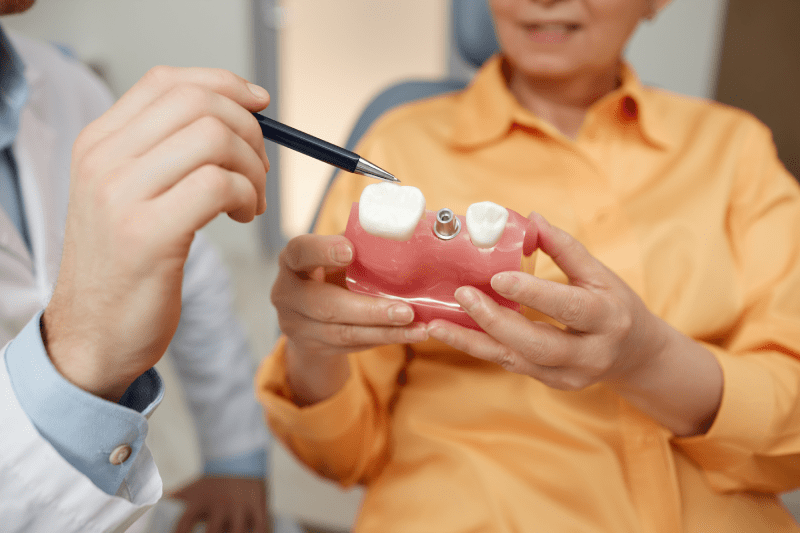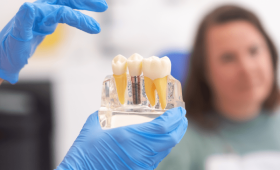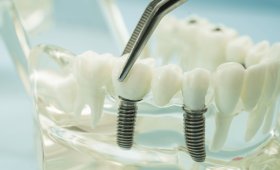How Much Does a Dental Implant Cost in Canada?
The cost of a single dental implant in Canada typically ranges between $3,000 and $6,000 CAD, depending on numerous factors. This price usually includes the implant post, the abutment (the connector piece), and the crown that is placed on top. However, these figures serve as a general guideline. The final cost of treatment can increase significantly based on factors such as the need for additional surgical procedures, the type of material used, and the location of the clinic.
How Much Do Full Mouth Dental Implants Cost?
Full mouth dental implant treatment (for both jaws) in Canada is a very expensive procedure. The cost for this comprehensive restoration typically ranges from $14,000 to $50,000 CAD, depending on the technology and material quality used. Popular methods like All-on-4 or All-on-6 aim to restore an entire jaw with a smaller number of implants, but even with these treatments, the total cost can vary greatly depending on the complexity of any additional procedures, such as bone grafting.
Do Prices Vary from Province to Province?
Yes, dental implant prices in Canada can vary significantly from province to province and even from city to city. For instance, in major cities like Toronto and Vancouver, prices are generally higher due to the increased operating costs and a higher cost of living. In smaller cities or regions, prices may be more affordable. Therefore, it is important to consider the geographical location when comparing prices.
What Factors Affect the Cost of Dental Implants?
The main factors influencing the cost of dental implants include the type of implant, the material used (titanium or zirconia), the dentist’s experience, and the clinic’s location. Additionally, extra costs such as the condition of the patient’s jawbone (whether bone grafting is needed), the number of implants, and anesthesia can also increase the total price. Initial stages like consultation, X-rays, and treatment planning also contribute to the overall cost.
Does Dental Insurance Cover Implant Treatment?
In Canada, dental insurance companies usually cover implant treatment only partially or not at all. Most implants are considered a cosmetic procedure and are therefore not fully covered by insurance. However, some insurance plans may cover only the surgical placement of the implant or the cost of the crown. It is important to contact your insurance company for detailed information on your coverage before starting treatment.
How Long Does All-on-4 Implant Treatment Take and What is the Cost?
All-on-4 implant treatment typically involves using 4 implants to restore all teeth with a fixed prosthesis in a single jaw. This treatment offers a quick and effective solution, especially for patients with no teeth. The cost of an All-on-4 implant for a single jaw in Canada can range from $20,000 to $30,000 CAD. Pricing depends on factors such as the implant brand and the prosthetic material used.
Is the Dental Implant Procedure Painful?
The dental implant procedure is generally not painful as it is performed under local anesthesia. Patients do not feel any pain during the operation. In the post-operative period, mild pain, swelling, or bruising may occur, but these can usually be easily managed with over-the-counter painkillers. Most patients describe the implant placement as being as comfortable as a tooth extraction.

How Long Do Dental Implants Last?
With proper care and regular check-ups, dental implants can be a lifelong solution. The implant itself, the titanium screw placed into the jawbone, is a biocompatible material that fuses with the bone, creating a strong foundation that does not decay over time. However, the crowns or prostheses placed on top of the implant may need to be replaced after 10-15 years due to wear and tear.
Is a Bone Graft Necessary and How Does It Affect the Cost?
Yes, sufficient jawbone volume and density are essential for successful dental implant placement. If the patient’s bone structure is insufficient, a bone graft (bone powder) may be required for the implant to be placed successfully. This additional surgical procedure prolongs the treatment process and significantly increases the cost. The bone grafting procedure is an important extra expense added to the total cost of implant treatment.
What Are the Advantages of Dental Implants?
Dental implants have several significant advantages. First, they fully restore chewing and speech functions, making them feel like natural teeth. They can also replace missing teeth without damaging adjacent teeth and help preserve facial structure by preventing jawbone loss. Aesthetically, they provide a natural look, which boosts the patient’s self-confidence.
Am I a Suitable Candidate for a Dental Implant?
To determine if you are a suitable candidate for implant treatment, a dental examination is essential. Generally, individuals with good oral health, sufficient jawbone density, and good overall health are good candidates for implants. For smokers or people with certain chronic diseases, the success rate of the implant may be lower, and additional treatment planning may be required.
How Long Does Dental Implant Treatment Take?
Dental implant treatment can take several months to complete as it is done in multiple stages. The first stage is the placement of the implant post into the jawbone. After this surgical procedure, there is a healing period of 3 to 6 months for the implant to fuse with the bone. Once the healing is complete, the final stage of placing the prosthesis or crown is performed.
What Are the Ways to Reduce the Cost of a Dental Implant?
There are several options to reduce the cost of a dental implant. For example, some clinics offer installment payments or financing plans. Additionally, getting treatment in a popular medical tourism country like Turkey can provide significant cost savings compared to prices in Canada. These options can help make the cost more manageable.
What Are the Types of Implants and How Do Prices Vary?
Dental implants are mainly made from two materials: titanium and zirconia. Titanium implants are the most common and affordable option. Zirconia implants are metal-free, more aesthetic, and ideal for patients with metal allergies, but they are generally more expensive. Additionally, different types of implants, such as endosteal and subperiosteal, have different pricing based on the patient’s jawbone structure.
How Safe Are Dental Implants?
Dental implants are a safe treatment method with a high success rate, used for decades. Modern implant materials (titanium and zirconia) are biocompatible, so they are easily accepted by the body, and the risk of infection is low. When applied by an expert dentist, implants provide a safe and effective outcome.
Can I Eat and Speak with Implants?
Yes, dental implants function just like natural teeth. With the implant firmly integrated into the bone, the prostheses remain stable, and chewing power reaches a level close to that of natural teeth. This allows patients to eat and speak comfortably.
What Should I Do for Oral Care After Implant Treatment?
Oral care after implant treatment is the same as for your natural teeth. You should brush and floss at least twice a day to keep the area around the implants clean. It is also very important to attend regular dental check-ups to ensure the longevity of the implant.
What Implant Brands Should I Choose for My Treatment?
The choice of implant brand is critical for the success of the treatment. Reputable brands with international recognition, such as Nobel Biocare, Straumann, Osstem, and BioHorizons, provide long-lasting and reliable results. These brands use high-quality materials to ensure the best possible integration of the implant with the bone.
What Type of Tooth is Placed on an Implant?
The tooth placed on an implant can be a crown, bridge, or denture. A crown is used for a single missing tooth, while a bridge or denture is preferred for multiple missing teeth. These restorations can be made from various materials like porcelain, zirconia, or metal-fused porcelain, depending on the patient’s aesthetic expectations and budget.
Is There a Risk of Implant Failure?
The success rate of dental implants is very high, but there is a rare risk of failure. Factors such as the implant failing to fuse with the bone, infection, or smoking can lead to failure. In case of failure, the implant is removed, the area is allowed to heal, and a new implant can be placed afterward.
Do Implant Teeth Look Like Natural Teeth?
Yes, thanks to modern dentistry, implant teeth look and feel like natural teeth. The dentist designs the crown placed on the implant to match the shape, size, and color of your other teeth. Especially when aesthetic materials like zirconia are used, it is almost impossible to tell that it’s an artificial tooth.
Is It Logical to Travel to Turkey for Implant Treatment?
Considering the high implant costs in Canada, getting implant treatment in Turkey can be a much more affordable option, even when including travel and accommodation expenses. Clinics in Turkey generally offer high-quality services and work according to international standards. This allows you to both save money and have a vacation experience.
What Is the Best Age Range for Getting an Implant?
The ideal age for implant treatment is 18 and above, when jawbone development is complete. In younger patients, the ongoing bone development can be negatively affected by the implant. In older patients, as long as bone density is sufficient, implant treatment can be successfully applied.
What Should I Pay Attention to After Getting a Dental Implant?
After implant treatment, it is very important to follow your doctor’s instructions. You should avoid hard foods and hot and cold drinks for the first few days. You should brush and floss your teeth regularly and not miss your check-ups. Additionally, limiting smoking and alcohol consumption contributes to the healing process.
How Does Oral and Dental Health Affect Implant Treatment?
The success of implant treatment is directly related to your general oral and dental health. Patients with problems like gum disease must have these issues resolved before starting implant treatment. Healthy gums and a clean oral environment ensure better integration of the implant with the bone and its longevity.
What Methods Are Available to Reduce Implant Prices?
To reduce implant prices, you can consider affordable options in medical tourism countries like Turkey. You can also compare prices from different clinics to find the most suitable option for your budget. Some clinics’ payment plans can also help make the cost more manageable.
Does Implant Treatment Harm Other Teeth?
No, dental implant treatment does not harm adjacent teeth. Unlike traditional bridge treatment, implants do not require the adjacent teeth to be cut or reduced to replace a missing tooth. This preserves the healthy tooth structure and extends the life of other teeth.
How Will My Quality of Life Change After Getting Implants?
Your quality of life will improve significantly after getting dental implants. Thanks to implants, you can eat and speak more comfortably, and your self-confidence will return. Since they function like natural teeth, you won’t feel any restrictions in your daily life.
What Is the Difference Between Implant and Crown Prices?
A dental crown only covers the upper part of a damaged tooth, and the tooth’s root is still in place. An implant, on the other hand, replaces the entire missing tooth, including the root. Therefore, implant treatment is generally more comprehensive and more expensive than crown treatment.
How Does the Implant’s Material Affect the Price?
The material the implant is made of directly affects the price. Titanium, the most commonly used material, is affordable and highly durable. Zirconia is more expensive due to its aesthetic appearance and biocompatibility.
Is the Implant Placement Process Painful?
The implant placement process is not painful as it is done under local anesthesia. Many patients say that this procedure is even less uncomfortable than a tooth extraction. Mild pain or discomfort that may occur after the procedure can be controlled with simple painkillers.

What Is the Preparation Process Before Implant Treatment?
Before implant treatment, a detailed examination by a dentist is performed. This examination may include X-rays and tomography scans. The dentist evaluates the condition of your jawbone and creates a personalized treatment plan for you.
What Is the Difference Between All-on-4 and All-on-6?
All-on-4 and All-on-6 are named according to the number of implants used for a full mouth restoration. All-on-4 treatment uses four implants to place a fixed prosthesis, while All-on-6 treatment uses six implants for a stronger support. All-on-6 is generally more expensive and may require more bone support.
Can an Implant Be Placed in a Toothless Jaw?
Yes, an implant can be placed in a toothless jaw. Solutions like All-on-4 or All-on-6 make it possible to restore the entire mouth with a single surgical procedure. Thanks to these methods, patients with a toothless jaw can have fixed and functional teeth in a short time.
Will My Teeth Look Natural After Getting Implants?
Dental implants look very natural because they are completed with crowns designed to match the color and shape of your natural teeth. As a result, no one will notice that you have an implant.
In What Situations Should I Get a Dental Implant?
A dental implant is the ideal solution if you have missing teeth, are not happy with removable solutions like bridges or dentures, or want to prevent jawbone loss.
For more information on dental implant treatment and pricing, you can contact Cure Holiday.



